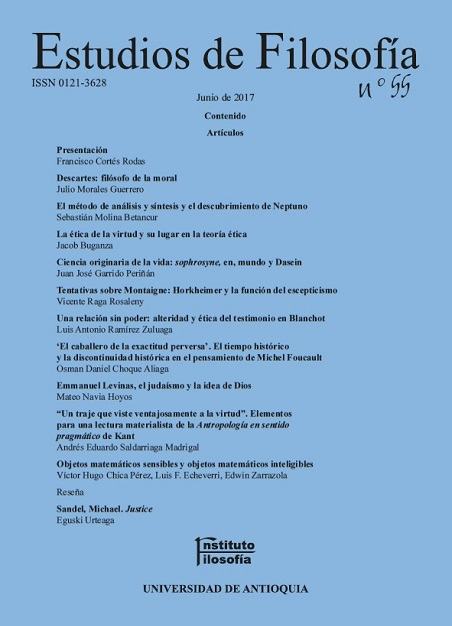Original Science of Life: sophrosyne, in, world and Dasein. About Plato and Heidegger
DOI:
https://doi.org/10.17533/udea.ef.n55a05Keywords:
Heidegger, Plato, phenomenology, original science of life, DaseinAbstract
We have discussed the phenomenological horizons of the Platonic sophrosyne together with the original science of life of Heidegger, in order to clarify the origin of all phenomena. To make such an attempt, we have made an analysis of the ontological dimension of Dasein, in its behavior-in-the-world. Finally, it has become clear how the only way to access this pre-theoretical science is using the phenomenology, in a radicalization of the principle of all principles.
Downloads
References
Aristóteles. (1999). Retórica, Madrid, Gredos.
Aristóteles. (1985). Ética Nicomáquea y Ética Eudemia, Madrid, Gredos.
Adrián, J. (2010). La idea de la Filosofía y el problema de la concepción de mundo, Barcelona, Herder.
Adrián, J. (2001). “El joven Heidegger: asimilación y radicalización de la filosofía práctica de Aristóteles”, Logos: Anales del Seminario de Metafísica, núm. 3, pp. 179-221, disponible en: http://revistas.ucm.es/index.php/ASEM/ article/view/ASEM0101110179A/16493.
Descartes, R. (2004). Meditaciones metafísicas, Madrid, Espasa-Calpe.
Heidegger, M. (2005). Phänomenologische Interpretation ausgewählter Abhandlungen des Aristoteles zu Ontologie und Logik. Gesamtausgabe, II. Abteilung, Band 62, Frankfurt a. M., Vittorio Klostermann.
Heidegger, M. (1999). Zur Bestimmung der Philosophie. Gesamtausgabe, II. Abteilung, Band 56/57, Frankfurt a. M., Vittorio Klostermann.
Heidegger, M. (1993a). Grundprobleme der Phänomenologie (WS 1919/1920). Gesamtausgabe, II. Abteilung, Band 58, Frankfurt a. M., Vittorio Klostermann.
Heidegger, M. (1993b). Grundbegriffe der antiken Philosophie. II. Abteilung, Band 22, Frankfurt a. M., Vittorio Klostermann.
Heidegger, M. (1992). Plato: Sophistes. Gesamtausgabe, II. Abteilung, Band 19, Frankfurt a. M., Vittorio Klostermann. Ciencia originaria de la vida: sophrosyne, en, mundo y Dasein 81
Heidegger, M. (1985). Phänomenologische Interpretationen zu Aristoteles. Einführung in die phänomenologische Forschung. Gesamtausgabe, II. Abteilung, Band 61, Frankfurt a. M., Vittorio Klostermann.
Heidegger, M. (1976a). Logik. Die Frage nach der Wahrheit. Gesamtausgabe, II. Abteilung, Band 21, Frankfurt a. M., Vittorio Klostermann.
Heidegger, M. (1976b). Wegmarken. Gesamtausgabe, I. Abteilung, Band 9, Frankfurt a. M., Vittorio Klostermann.
Heidegger, M. (1967). Sein und Zeit, Tübingen, Max Niemeyer.
Husserl, E. (1977). Ideen zu einer reinen Phänomenologie und phänomenologischen Philosophie. Erstes Buch: Allgemeine Einführungin die reine Phänomenologie. Husserliana XIX/I, Den Haag, Martinus Nijhoff.
Husserl, E. (1974). Formale und transzendentale Logik. Husserliana XVII, Den Haag, Martinus Nijhoff.
Husserl, E. (1966). Zur Phänomenologie des inneren Zeitbewußtsein. Husserliana X, Den Haag, Martinus Nijhoff.
Husserl, E. (1959). Erste Philosophie, Zweiter Teil: Theorie der phänomenologischen Reduktion. Husserliana VIII, Den Haag, Martinus Nijhoff.
Lask, E. (1923). “Die Logik der Philosophie und die Kategorienlehre”, En: Gesammelte Schriften II, Tübingen: J. C. B. Mohr.
Lyotard, F. (2008). La posmodernidad explicada a niños, Barcelona, Gedisa.
Platón. (1985). Diálogos I, Madrid, Gredos.
Platón. (1983). Diálogos II, Madrid, Gredos.
Taylor, A. D. (2014). Platón, Madrid, Tecnos.
Downloads
Published
How to Cite
License
Copyright (c) 2017 Juan José Garrido Periñán

This work is licensed under a Creative Commons Attribution-NonCommercial-ShareAlike 4.0 International License.
Authors who publish with this journal agree to the following terms:
1. The Author retains copyright in the Work, where the term "Work" shall include all digital objects that may result in subsequent electronic publication or distribution.
2. Upon acceptance of the Work, the author shall grant to the Publisher the right of first publication of the Work.
3. The Author shall grant to the Publisher a nonexclusive perpetual right and license to publish, archive, and make accessible the Work in whole or in part in all forms of media now or hereafter known under a Creative Commons Attribution-NoCommercia-ShareAlike (CC BY-NC-SA 4.0), or its equivalent, which, for the avoidance of doubt, allows others to copy, distribute, and transmit the Work under the following conditions: (a) Attribution: Other users must attribute the Work in the manner specified by the author as indicated on the journal Web site;(b) Noncommercial: Other users (including Publisher) may not use this Work for commercial purposes;
4. The Author is able to enter into separate, additional contractual arrangements for the nonexclusive distribution of the journal's published version of the Work (e.g., post it to an institutional repository or publish it in a book), as long as there is provided in the document an acknowledgement of its initial publication in this journal;
5. Authors are permitted, and Estudios de Filosofía promotes, to post online the preprint manuscript of the Work in institutional repositories or on their Websites prior to and during the submission process, as it can lead to productive exchanges, as well as earlier and greater citation of published work (see The Effect of Open Access). Any such posting made before acceptance and publication of the Work is expected be updated upon publication to include a reference to the Estudios de Filosofía's assigned URL to the Article and its final published version in Estudios de Filosofía.















